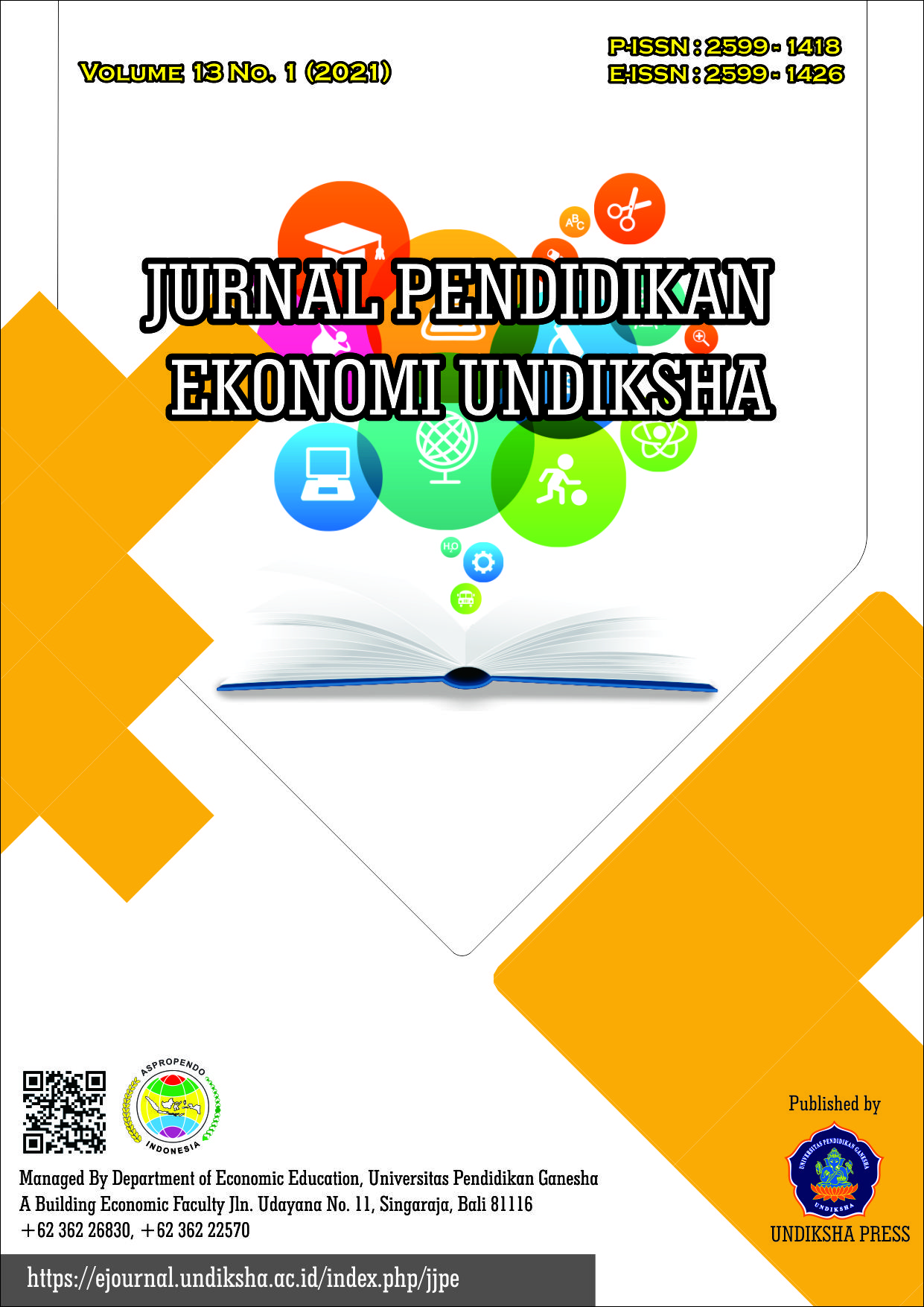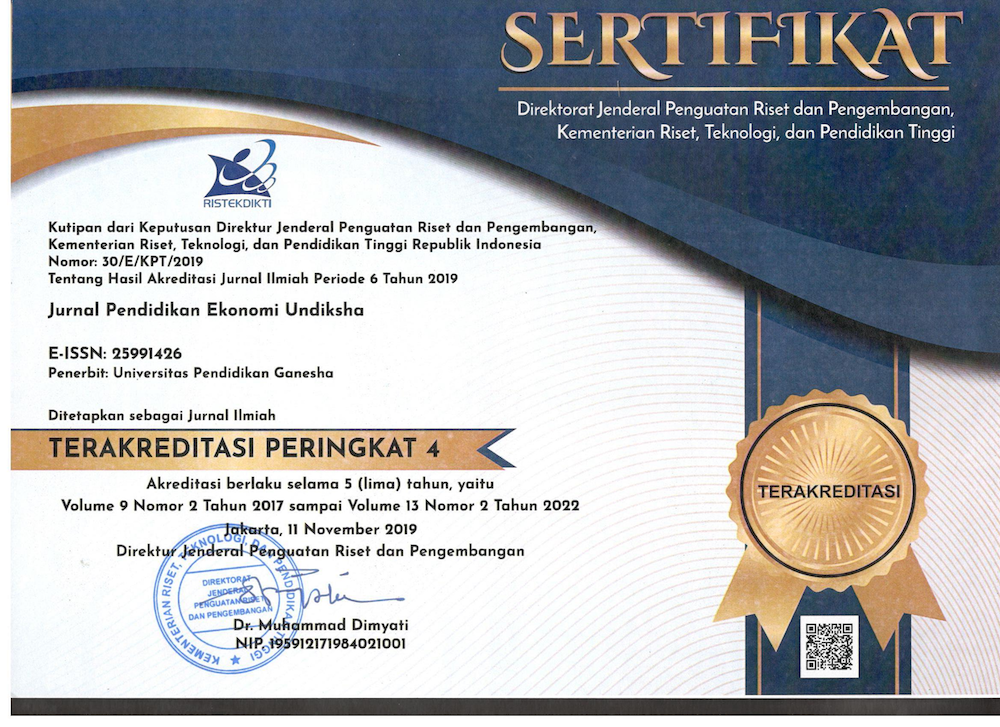Pengaruh Mata Diklat Produktif Akuntansi, Kompetensi Siswa, dan Lingkungan Keluarga Terhadap Kesiapan Kerja Melalui Mediasi Efikasi Diri
DOI:
https://doi.org/10.23887/jjpe.v13i1.33011Kata Kunci:
accounting productive subject, student’s competence, family environment, self efficacy, work readinessect, Student’s Competence, Family Environment, Self Efficacy, Work ReadinessAbstrak
This research was an associative quantitative research which aims to determine whether or not there was an influence of of accounting productive subject, student competence, family environment on work readiness either directly or through self-efficacy mediation in class XI accounting students of SMK Negeri 2 Buduran. The sample calculation used the simple random sampling method with the Slovin formula and obtained a sample of 86 students of class XI accounting at SMK Negeri 2 Buduran in the 2019/2020 school year. The technique of collecting data used interviews, documentation to obtain the value of accounting productive subject, and closed questionnaires that had been tested for validity and reliability. The data analysis technique used descriptive analysis, data transformation, and hypothesis testing of direct and indirect effects. The results of the direct effect test are the accounting productive subject, student competence, and self-efficacy affect work readiness. Meanwhile, the family environment has no effect on work readiness. The indirect effect test, namely self-efficacy, can mediate the effect of student competence and the family environment on work readiness. However, self-efficacy cannot mediate the effect of the accounting productive subject on work readiness.
Referensi
Afriani, R., & Setiyani, R. (2015). Pengaruh Persepsi Siswa Tentang Kompetensi Kejuruan, Penguasaan Soft Skill, dan Kematangan Karir Terhadap Kesiapan Kerja Siswa Kelas XII Akuntansi SMK Negeri 2 Magelang Tahun Ajaran 2014/2015. Economic Education Analysis Journal2, 4(2), 453–468.
Ahmadi, A. (2007). Sosiologi Pendidikan. Jakarta: Rineka Cipta.
Badan Pusat Statistik. (2019). Tingkat Pengangguran Terbuka Menurut Pendidikan Tertinggi yang Ditamatkan. https://www.bps.go.id/statictable/2009/04/16/972/pengangguran-terbuka-menurut-pendidikan-tertinggi-yang-ditamatkan-1986---2018.html
Cavanagh, J., Burston, M., Southcombe, A., & Bartram, T. (2015). Contributing to a graduate-centred understanding of work readiness: An exploratory study of Australian undergraduate students’ perceptions of their employability. The International Journal of Management Education, 13, 278–288. http://dx.doi.org/10.1016/j.ijme.2015.07.002.
Elliyani, C., Yanto, H., & Sunarto, S. (2016). Determinan Kesiapan Kerja Siswa SMK Kelas XII Kompetensi Keahlian Akuntansi di Kota Semarang. Journal of Economic Education, 5(1), 22–30.
Ghufron, M. N., & Risnawita, R. (2012). Teori-teori Psikologi. Yogyakarta: Ar-Ruzz Media.
Goh, L. L. (2008). The effects of self-efficacy on career choices and job readiness among people with intellectual disability in Singapore. Nanyang Technological University.
Handayani, U. S., & Setiyani, R. (2015). Pengaruh Prestasi Akademik Mata Diklat Produktif Akuntansi, Prakerin, dan Lingkungan Keluarga Terhadap Kesiapan Kerja Siswa SMKN 1 Kebumen. Economic Education Analysis Journal, 4(3), 864–875.
Jannah, U. M., Suswanto, H., & Handayani, A. N. (2016). Vocational High School Student’s Readiness to Work in Internet Service Provider Enterprise: Based on Mastery Vocational Competence, Internship and Job Interest. Proceedings of the International Mechanical Engineering and Engineering Education Conferences (IMEEEC 2016), 030044-1-030044–030048. https://doi.org/10.1063/1.4965778
Muktiani, E. E. (2014). Pengaruh Praktik Kerja Industri dan Prestasi Akademik Mata Diklat Produktif Akuntansi Terhadap Kesiapan Kerja Siswa Kelas XI Program Keahlian Akuntansi SMK Nasional Pati Tahun Pelajaran 2012/2013. Economic Education Analysis Journal, 3(1), 166–172.
Mulyasa, E. (2006). Kurikulum Berbasis Kompetensi. Bandung: Remaja Rosdakarya.
Murniati, & Usman, N. (2009). Implementasi Manajemen Stratejik Dalam Pemberdayaan Sekolah Menengah Kejuruan. Bandung: Citapustaka Media Perintis.
Nifah, Aisatun. (2015). Pengaruh Pengalaman Praktik Kerja Industri (prakerin), Efikasi Diri, dan Kompetensi Akuntansi Terhadap Kersiapan Kerja Siswa Kelas XII Program Keahlian Akuntansi Di SMK PGRI 2 Kota Salatiga Tahun Ajaran 2014/2015. Skripsi. Universitas Negeri Semarang, Semarang.
Nurhayati, & Kusmuriyanto. (2019). Pengaruh Kompetensi Produktif Akuntansi, Prakerin, dan Lingkungan Keluarga Melalui Efikasi Diri Terhadap Kesiapan Kerja. Economic Education Analysis Journal, 8(2), 568–587. https://doi.org/10.15294/eeaj.v8i2.31484.
Oliver, B., Whelan, B., Hunt, L., & Hammer, S. (2011). Accounting graduates and the capabilities that count: Perceptions of graduates, employers and Accounting academics in four Australian universities. Journal of Teaching and Learning for Graduate Employability, 2(1), 2–27. https://doi.org/10.21153/jtlge2011vol2no1art550.
Pajic, S., Ulceluse, M., Kismihok, G., Mol, S. T., & Hartog, D. N. (2018). Antecedents of job search self-efficacy of Syrian refugees in Greece and the Netherlands. Journal of Vocational Behavior, 105, 159–172. https://doi.org/10.1016/j.jvb.2017.11.001.
Pappas, T. S., & Kounenoua, K. (2011). Career decision making of Greek post secondary vocational students: the impact of parents and career decision making self efficacy. Procedia Social and Behavioral Sciences, 15, 3410–3414. https://doi.org/10.1016/j.sbspro.2011.04.310.
Pemerintah RI. Undang-Undang Republik Indonesia Nomor 13 Tahun 2003 Tentang Ketenagakerjaan. , (2003).
Peraturan Pemerintah RI. Peraturan Pemerinah Republik Indonesia Nomor 29 Tahun 1990 Tentang Pendidikan Menengah. , (1990).
Saputri, Melinda L. (2016). Pengaruh Praktik Kerja Lapangan (PKL), Lingkungan Keluarga, dan Self-Efficacy Terhadap Kesiapan Kerja Siswa Kelas XII Akuntansi SMK Negeri 1 Kebumen Tahun Ajaran 2015/2016. Skripsi. Universitas Negeri Semarang, Semarang.
Schultz, D. P., & Schultz, S. E. (2013). Theories of Personality (Tenth Edit). Wadsworth: Cengage Learning.
Setyawati, R. (2018). Pengaruh Pengalaman Praktik Kerja Industri, Pelaksanaan Bimbingan Kejuruan dan Dukungan Keluarga terhadap Kesiapan Kerja Siswa SMK Swasta di Kabupaten Bantul. JURNAL SOSIAL HUMANIORA DAN PENDIDIKAN, 2(1), 36–45.
Slameto. (2013). Belajar dan Faktor-faktor yang Mempengaruhinya. Jakarta: Rineka Cipta.
Solimun, Fernandes, A. A. R., & Nurjannah. (2018). Metode Statistika Multivariat - Permodelan Persamaan Struktural (SEM) Pendekatan WarpPLS. Malang: UB Press
.
Sugiyono. (2018). Metode Penelitian Pendidikan -Pendekatan Kuantitatif, Kualitatif, dan R&D. Bandung: Alfabeta.
Sukardi, D. K. (1993). Bimbingan Karir di Sekolah-sekolah. Jakarta Timur: Ghalia Indonesia.
Surachim, A. (2016). Efektivitas Pembelajaran Pola Sistem Ganda. Bandung: Alfabeta.
Suwati. (2008). Sekolah Bukan Untuk Mencari Pekerjaan. Jakarta Timur: Grafindo Media Pratama.
Tomlinson, M. (2008). ‘The degree is not enough’: students’ perceptions of the role of higher education credentials for graduate work and employability. British Journal of Sociology of Education, 29(1), 46–61. https://doi.org/10.1080/01425690701737457.
Triani, D., & Arief, S. (2016). Pengaruh Praktik Kerja Industri, Hasil Belajar Akuntansi, dan Motivasi Memasuki Kerja Terhadap Kesiapan Kerja Siswa Akuntansi. Economic Education Analysis Journal, 5(3), 849–859.
Utami, Y. G. D., & Hudaniah. (2013). Self Eficacy Dengan Kesiapan Kerja Siswa Sekolah Menengah Kejuruan. Jurnal Psikologi Terapan, 1(1), 40–52.
Valid, Y. M., & Taman, A. (2013). Pengaruh Pengalaman Praktik Industri Dan Prestasi Belajar Terhadap Kesiapan Kerja Siswa Kelas XI Program Keahlian Akuntansi SMK YPKK 2 Sleman Yogyakarta. Kajian Pendidikan Akuntansi Indonesia, 2(1), 161–183.
Winkel, W. S., & Hastuti, M. M. S. (2013). Bimbingan Konseling Di Institusi Pendidikan. Yogyakarta: Media Abadi.
Wulandari, Septiani. (2017). Pengaruh Motivasi Kerja dan Prestasi Belajar Mata Pelajaran Produktif Akuntansi Terhadap Kesiapan Kerja Pada Siswa Kelas XII Akuntansi SMKN 42 Jakarta. Skripsi. Universitas Negeri Jakarta, Jakarta.





